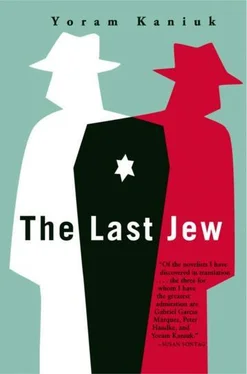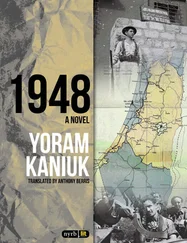For two weeks I was quite busy. Along with my editor and a few other people from Harper & Row, I flew to six cities in a row, appeared on television and radio, held press conferences, was interviewed, lectured, and our young attache, a handsome woman named Kristina, took Renate and me to a lot of cocktail parties, endless meetings; I even gave a lecture at the PEN Club in New York, I'm not complaining, in our day a writer has to play the clown, the portable philosopher, and I had to do that for myself and my publishers, my agent and Renate. I know that Schiller and Goethe didn't fly to public relations tours, but needless to say the times-and the people-have changed. After two crammed weeks I parted from the editor, the attache, our consul, from some American writers, a few of whom I had met before, we took our bags, and instead of going to the airport, we went to a small hotel in Greenwich Village, slept quietly one night, and in the morning, I called Lionel.
Lionel was glad to meet me. I told him how much I liked the Laments on the Death of the Jews. He told me that he had high regard for me, after all, he said, I wrote the first article about you in The New York Times. And indeed, I remembered that he had written and was amazed that I hadn't thought about that, and after mutual compliments, I on the Laments and he on the novella, and after he expressed amazement that his Laments were now being published in all the countries of Europe except Germany, I said I was indeed astonished.
On our way to him, we bought white wine (made in Israel) and Renate bought a bouquet of flowers, and at a temperature of two below zero, in the cold wind blowing from the river, we came to Lionel's house. I must tell you that I was more excited than I had imagined.
Lily opened the door and was exactly what I had expected her to be, some undefined femininity, something between a lion and a summer flower. On her face the sadness of polished matter clean of sediments, was smiling serene, both deep and bright. At the age of forty, she looked rare, feminine, and an almost Mediterranean olive tone slipped among the northern tones as if they were bold storms on a marble surface. In her eyes is a dark touch and they look very bright, and yet the elusive gloom made them mysterious. She held out her hand and said in English: Welcome, she invited us inside and when we took off our coats and the warmth spread in our bodies, we offered the wine and the flowers and we saw Lionel. Lionel is tall, but not too tall, thin, his hair is silver and short and his face is lit by that light many Jewish intellectuals have, some mischievous flash in the dark eyes, wrapped in dark eyebrows, reflecting an alien, ancient melancholy, and when I looked at him I thought of the sentence of Spinoza (and Lionel's eyes reminded me of his), that God is celestial harmony and that His laws of morality are universal and hence are not an imitation of the laws of nature. Confronting Lionel's eyes, I thought that only Jews, that stubborn and wise tribe, could have created such a sublime and unnatural idea. Who if not the Jews had to know in their flesh how impossible that idea is, but the persistence in believing that there is a moral law that is not synonymous with the laws of nature, grants Hebrew tribalism the exciting, but no less annoying greatness. There was also some savagery etched on Lionel's face, something that strives for personal freedom, and I thought about the expression frozen fire, I thought to myself: Maybe that's how Joseph Rayna looked, or at least something from Joseph Rayna was looking at me and I couldn't take my eyes off Lionel, who was wearing a blue cashmere sweater and thin corduroy trousers and his hands are delicate, but not unmasculine. Lily persisted in speaking English with us, even when Lionel, Renate, and I were speaking German. I loved her for that, and in my heart, maybe I was also angry. The apartment is beautiful, the garden looked gray under the thin shroud of ice, I loved the furniture and the pictures on the walls. Later on, Renate told me that something in the blend (as she said) of the physical furniture, the pictures, the books and the atmosphere, reminded her of your apartment, although the apartments are so different. She talked about color and form that turn into an echo.
I thought about Cervantes's sentence that the pen is the tongue of the soul. Maybe the apartment is simply the thermometer of those who live in it. The conversation, of course, slid to the Last Jew. Never for a moment did I believe that Lily didn't know that Lionel and Sam are sons of the same father, but it was strange for me to think that Lionel didn't know that and that it was so important for those concerned that he not know. Later on, when I met Sam, I understood that he had to preserve lines of defense for himself and that he never trusted anybody-except Ebenezer and Lily-fully. After more than twenty years in the United States, he still felt foreign. As in his relations with Licinda, he always had to be on guard. Lily came from the same world of which Ebenezer is the last remnant. Deep in his heart, Sam Lipp believes that Ebenezer doesn't recite the Last Jew, but that he is the Last Jew, and everything seen in his eyes, and felt, is nothing but a delusion he's willing to live in, but whose logic he doesn't have to accept. That's strategic room for maneuver, a bit mendacious, a kind of pocket pogrom and anti-pogrom he keeps with him as a guarantee for his life. Thus Sam still sells his lampshade, hates what he can't forgive himself, takes revenge on himself for being prevented from taking revenge on the world that Ebenezer maintained was annihilated.
Sam's dreams are so strong that Lily started dreaming his dreams and sometimes she wakes up at night in a cold sweat (she told Renate this as she was drinking), gets up, goes to Sam and Licinda's room, and he's lying there, his eyes wide open, shaking, even Licinda started dreaming Sam's dreams.
I said I didn't know where Ebenezer was living today, but Lily glanced at me offended, since she knew very well that I knew, and then she said in German: Watch out, Sam does dangerous things, maybe what you don't know can sometimes be good.
Lionel told me he had found material in the public library that had been copied by a scholar from Brandeis University. It was a precise account of an evening in a nightclub in London where Ebenezer performed many years ago. I came on that material, said Lionel, when I discovered that one of the laments I wrote was made into an opera and the composer, a German Jew named Weiss, found the libretto in the library. I found a few laments whose provenance I didn't know, they weren't exactly my laments, but one of them was very similar to my sixth lament, about the child who extracted gold teeth. You know the lament, he said confidently, and I did indeed remember it. The composition is called "Sources for the Burial of Moses, Story of the Golden Calf and Its Location," and the material Ebenezer recited was that composition-in addition to the other laments, including my lament-and was composed from Ebenezer's words, by Yehuda Ber Avram ben Abraham and printed in Leipzig in 1984. And the year 1984 is still very far from us, said Lionel. I told him I knew about that composition and was quite amazed by it, and Lionel said that among the papers and manila files were annals of a Crusader (I immediately verified the story) and some meeting between SS Sturmbahnfuhrer Kramer and Nehemiah Schneerson, husband of Rachel Schneerson, a meeting that was held, said Lionel, in nineteen nine. I was excited to hear these things and asked if he didn't mean Boaz, and he said: No, Nehemiah. Lionel asked if that was so important, since I looked quite excited and my face was surely beaming and I said Yes, yes. He told me: I've got a copy of this material and I'll bring it to you. We sat and drank the wine we had brought and Lily didn't talk anymore, but chain-smoked, with restrained pensiveness, and then Lionel came back and gave me a copy of the material, I glanced at it and then put it in my pocket.
Читать дальше












